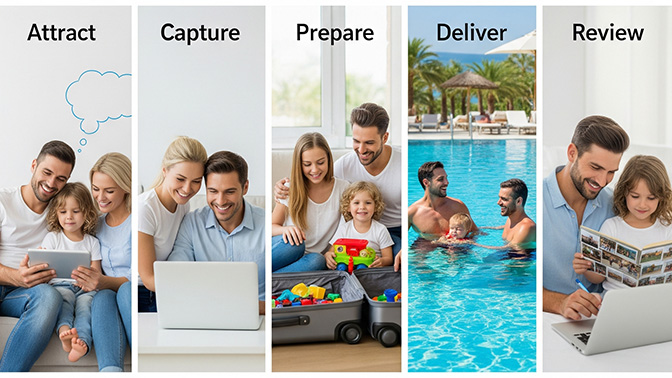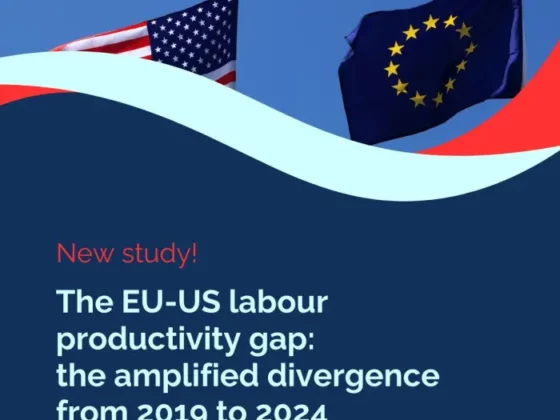
Hospitality is one of humanity’s oldest professions. For thousands of years, travelers have sought lodging that fulfills core human needs: comfort, safety, convenience, and belonging. Every successful hotel understands that managing the guest journey is a strategic process, beginning long before guests arrive and continuing long after they depart. How well a hotel manages each stage directly influences overall guest satisfaction, loyalty, and the establishment’s reputation.
The foundational stages of the guest journey from the hotel perspective remain timeless: Attract, Capture, Prepare, Deliver, and Review. Today’s travelers share the exact fundamental needs as travelers thousands of years ago. Still, the methods hotels use to meet these needs have significantly evolved due to advancements in technology, shifts in culture, and changing guest expectations. Understanding the enduring nature of these stages and continuously refining their execution is critical to sustained success.
This article explores each of the five timeless stages of the guest journey from the hotel’s perspective. For each stage, we will highlight the unchanging core guest needs, discuss the hotel’s critical roles, and share best practices and modern strategies for optimizing operations and enhancing the guest experience. By recognizing the constant nature of guest expectations while adapting to emerging trends, hotels can thrive amidst change and maintain guest loyalty and satisfaction.
Stage 1: Attract – Creating Awareness and Interest
Objective from the Hotel’s Perspective
The primary objective at this stage is to generate interest in your hotel and create a powerful first impression that resonates with potential guests. This initial interaction sets expectations and forms the foundation of the guest’s perception, impacting their decision-making and ultimately their choice of accommodation.
Why This Stage Matters
In today’s competitive hospitality landscape, guests have abundant options. A hotel that communicates its unique offerings, resonates emotionally with its target audience, and stands out from competitors is more likely to capture attention, build curiosity, and influence the booking decision.
Key Hotel Actions
Clearly Define Your Target Audience
- Analyze historical guest data to understand your ideal guests, including their demographics, motivations, preferences, and behaviors.
- Create detailed guest personas/segments to guide marketing strategies and messaging.
Market Your Hotel’s Unique Selling Points (USPs)
- Identify and articulate your distinct features, such as location advantages, exclusive amenities, historical significance, design, or exceptional services.
- Use authentic storytelling to showcase these USPs, highlighting what differentiates your property from competitors.
Engage Potential Guests with Inspiring Content
- Regularly produce visually appealing and emotionally engaging content (videos, photographs, blog posts) that highlights your hotel experience and the surrounding destination.
- Leverage social proof through guest testimonials, reviews, and success stories, demonstrating real-world satisfaction.
Action Checklist for Hotels
- Conduct an audit of your current digital marketing and social media efforts.
- Refine or develop detailed guest personas based on historical and market data.
- Create and implement a content calendar aligned with your hotel’s USPs.
- Set up analytics tools to measure content effectiveness and user engagement.
- Regularly update your digital presence and messaging based on insights derived from analytics and evolving guest preferences.
By taking these deliberate actions, hotels can strategically attract the right guests, setting the stage for deeper engagement, conversions, and ultimately long-term loyalty.
Stage 2: Capture – Turning Interest into Bookings
Objective from the Hotel’s Perspective
The central goal at this stage is converting potential guest interest into confirmed reservations. Capturing a guest involves transitioning them seamlessly from initial curiosity to a decisive commitment—an action that directly impacts occupancy, revenue, and overall hotel success.
Why This Stage Matters
Guests today have many options at their fingertips, making it crucial for hotels to facilitate a frictionless booking process. An intuitive, secure, and straightforward booking experience directly influences guest satisfaction, reduces abandonment rates, and encourages guests to book directly, resulting in higher profitability and stronger guest relationships.
Key Hotel Actions
Optimize Your Booking Process for Ease, Clarity, and Security
- Ensure your website booking engine is intuitive, fast-loading, and mobile-friendly.
- Minimize the number of clicks and forms required to complete a booking.
- Provide immediate, precise confirmation details and guarantee data security.
Offer Competitive, Transparent Pricing
- Communicate pricing structures, including taxes, fees, and cancellation policies, upfront to build trust.
- Highlight direct-booking benefits such as best-price guarantees, flexibility, or complimentary amenities.
Utilize Tactical Incentives
- Create attractive direct-booking incentives, such as room upgrades, welcome amenities, loyalty rewards, or exclusive offers.
- Promote limited-time offers or packages tailored to specific audience segments, creating urgency and enhancing perceived value.
Action Checklist for Hotels
- Regularly test and audit the booking engine on all devices (desktop, tablet, mobile) to ensure optimal performance.
- Evaluate pricing transparency—ensure that pricing information is clear, consistent, and competitive.
- Clearly define direct-booking benefits and actively promote these incentives throughout your website and marketing campaigns.
- Integrate advanced revenue management software to implement real-time dynamic pricing.
- Introduce AI-driven customer support solutions like chatbots to assist potential guests instantly and convert queries into bookings.
By effectively implementing these practices, hotels significantly increase their ability to convert interest into secured reservations, laying the foundation for guest satisfaction and future loyalty.
Stage 3: Prepare – Ensuring a Smooth and Personalized Arrival
Objective from the Hotel’s Perspective
This stage focuses on setting clear expectations, fostering excitement, and creating personalized experiences before guests even set foot in the hotel. The preparation phase aims to make guests feel valued, anticipated, and assured, enhancing their overall satisfaction.
Why This Stage Matters
Guests often form lasting impressions before arriving at a hotel. Proactive communication and thoughtful preparation not only build excitement but also reduce uncertainty, making guests feel welcomed and comfortable even before arrival. This approach contributes significantly to positive guest experiences, higher guest satisfaction ratings, and enhanced loyalty.
Key Hotel Actions
Communicate Proactively about Services, Amenities, and Destination Highlights
- Send detailed yet engaging pre-arrival communications about available hotel services, facilities, local attractions, events, and practical information (directions, weather, check-in details).
- Provide clear guidance and reassurance, ensuring guests know exactly what to expect upon arrival.
Personalize Pre-Arrival Interactions
- Offer tailored upsell and cross-sell opportunities that align with guest preferences—such as room upgrades, spa treatments, dining experiences, or local tours.
- Customize your communications to reflect the specific reason guests chose your hotel, enhancing anticipation and satisfaction.
Prepare Guest Preferences and Requests in Advance
- Systematically gather and utilize guest information (special requests, dietary needs, special occasions) to ensure a seamless, personalized arrival experience.
- Train staff to review guest profiles proactively, preparing rooms and amenities to match individual preferences.
Action Checklist for Hotels
- Send standardized, personalized pre-arrival communication templates promptly.
- Train and empower staff to regularly access and update CRM guest profiles.
- Establish clear internal processes for tracking, managing, and fulfilling pre-arrival guest requests and preferences.
- Implement digital solutions (apps, web portals) for personalized pre-arrival engagement and streamlined digital check-in.
- Regularly assess and refine the pre-arrival experience by analyzing guest feedback and continuously improving the process.
By proactively preparing for guest arrivals and personalizing the experience, hotels can create positive, lasting impressions, significantly influencing guest satisfaction, loyalty, and advocacy.
Stage 4: Deliver – Providing Exceptional On-Site Experiences
Objective from the Hotel’s Perspective
To meet—and wherever possible—exceed guest expectations by delivering consistent, personalized, and memorable service throughout every moment of their stay.
Why This Stage Matters
The on-site experience is the cornerstone of hospitality. Guests judge the value of their entire stay based on how well their needs are anticipated and met in real time. Outstanding service fosters emotional connections, drives positive reviews, and solidifies long-term loyalty.
Key Hotel Actions
Deliver Personalized, Proactive Service
- Greet guests by name and acknowledge any special occasions or preferences noted in their profile.
- Anticipate needs—offer a refreshing beverage on arrival, proactive turndown service, or recommendations for local experiences before they’re requested.
Regularly Train Staff to Maintain and Exceed Service Standards
- Conduct frequent role-playing and service workshops to reinforce your brand’s service culture and ensure staff can handle a range of scenarios.
- Share “moments of excellence” from guest feedback to inspire and guide team members.
Monitor and Immediately Address Guest Requests and Concerns
- Empower staff to resolve issues on the spot—whether it’s a room adjustment, special dietary need, or a concierge request—without needing managerial approval.
- Institute a “service recovery” protocol to follow up swiftly whenever a guest indicates dissatisfaction.
Action Checklist for Hotels
- Implement a guest messaging solution and train staff to use it for proactive service.
- Schedule quarterly service-excellence training, incorporating real guest scenarios and feedback.
- Develop and communicate clear protocols for rapid service recovery and empower front-line staff to act.
- Install or integrate IoT room controls that tie into your property management system and guest profiles.
- Set up real-time satisfaction monitoring dashboards and assign responsibility for monitoring and follow-up.
By focusing on proactive personalization, rigorous staff training, and real-time responsiveness—supported by innovative technology—hotels can consistently deliver on their promise of exceptional hospitality, turning each stay into a standout experience.
Stage 5: Review – Gathering Feedback and Building Relationships
Objective from the Hotel’s Perspective
Gain a deep understanding of guest satisfaction, extract actionable insights, and nurture lasting relationships that drive loyalty and repeat business.
Why This Stage Matters
The post-stay phase is your opportunity to learn what truly resonated—and what fell short—so you can continuously elevate your service. By actively soliciting and acting on feedback, you demonstrate to guests that their opinions matter, strengthening emotional bonds and encouraging them to choose you again.
Key Hotel Actions
Actively Request and Collect Guest Feedback Post-Stay
- Send personalized thank-you emails with brief, targeted surveys immediately after departure.
- Encourage reviews on key platforms (TripAdvisor, Google) by providing direct links and simple instructions.
Analyze Feedback Systematically and Implement Improvements Swiftly
- Aggregate feedback into categories (e.g., service, facilities, dining) and track trends over time.
- Convene regular cross-departmental “feedback review” meetings to prioritize and assign follow-up actions.
Maintain Post-Stay Engagement to Encourage Loyalty and Repeat Visits
- Follow up with segmented communications—special return offers for families, business-travel perks for corporate guests, or seasonal promotions for past leisure visitors.
- Invite guests to join your loyalty program, highlighting their earned points and benefits to incentivize their next stay.
Action Checklist for Hotels
- Configure automated post-stay surveys with 3–5 targeted questions and set up real-time alerts for negative feedback.
- Establish a monthly “Guest Insights” meeting to review feedback data and track completion of improvement initiatives.
- Design segmented post-stay email campaigns with tailored offers based on guest type (leisure, business, group).
- Audit and optimize your loyalty program’s digital integration—ensure points balances, offers, and redemption options are visible in guest communications and on your website/app.
- Monitor online review sites daily and respond promptly—thanking positive reviewers and addressing any concerns raised.
By closing the loop—collecting feedback, acting on it, and maintaining meaningful engagement—hotels not only demonstrate their commitment to continuous improvement but also transform one-time guests into loyal advocates.
Key Takeaways
Master the Five-Stage Framework
The sequence of Attract → Capture → Prepare → Deliver → Review forms a timeless roadmap for managing every interaction a hotel has with its guests, from initial awareness through ongoing loyalty.
Adapt “How”, Keep the “What” Constant
Although guest needs and expectations remain fundamentally the same, hotels must continually evolve the methods and technologies they use at each stage to stay competitive and meet modern demands.
Leverage Each Stage to Build Loyalty
Every phase presents unique opportunities for personalization—from targeted marketing in the Attract phase to proactive service delivery and thoughtful follow-up in the Review phase. Tailored actions at each step deepen guest satisfaction and foster long-term loyalty.
Conclusion
Final Thoughts
Hotels that thoughtfully manage each stage of the guest journey position themselves to thrive in a competitive landscape. While the core needs of comfort, safety, and belonging remain timeless, continuously refining how you meet those needs—by adopting new tools, personalizing interactions, and leveraging data—ensures your property stays relevant and memorable.
Call to Action
Now is the time to critically assess your current guest journey strategy. Identify gaps in each of the five stages, explore emerging technologies, and implement targeted improvements. By doing so, you’ll create consistently satisfying experiences that turn first-time visitors into lifelong guests.






